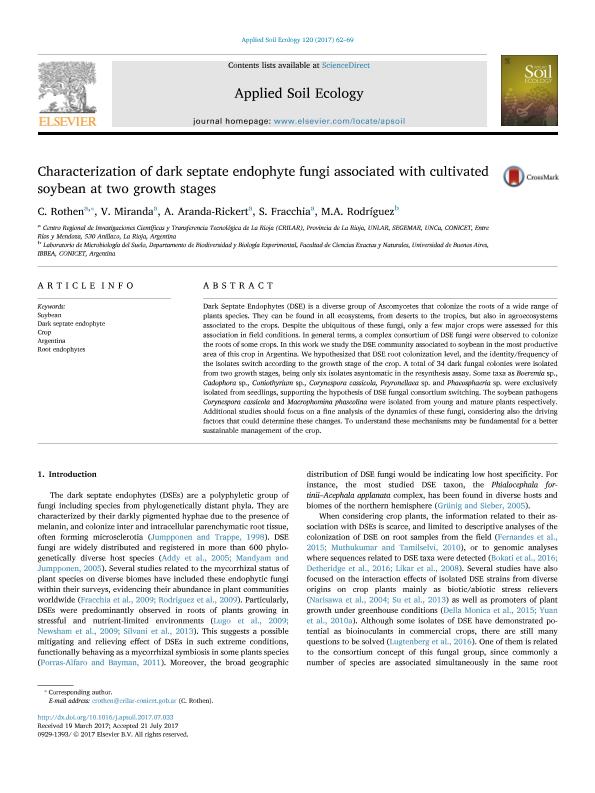Artículo
Characterization of dark septate endophyte fungi associated with cultivated soybean at two growth stages
Rothen, Carolina Paola ; Miranda, María Victoria
; Miranda, María Victoria ; Aranda Rickert, Adriana Marina
; Aranda Rickert, Adriana Marina ; Fracchia, Sebastian
; Fracchia, Sebastian ; Rodríguez, M.A.
; Rodríguez, M.A.
 ; Miranda, María Victoria
; Miranda, María Victoria ; Aranda Rickert, Adriana Marina
; Aranda Rickert, Adriana Marina ; Fracchia, Sebastian
; Fracchia, Sebastian ; Rodríguez, M.A.
; Rodríguez, M.A.
Fecha de publicación:
11/2017
Editorial:
Elsevier Science
Revista:
Applied Soil Ecology
ISSN:
0929-1393
Idioma:
Inglés
Tipo de recurso:
Artículo publicado
Clasificación temática:
Resumen
Dark Septate Endophytes (DSE) is a diverse group of Ascomycetes that colonize the roots of a wide range of plants species. They can be found in all ecosystems, from deserts to the tropics, but also in agroecosystems associated to the crops. Despite the ubiquitous of these fungi, only a few major crops were assessed for this association in field conditions. In general terms, a complex consortium of DSE fungi were observed to colonize the roots of some crops. In this work we study the DSE community associated to soybean in the most productive area of this crop in Argentina. We hypothesized that DSE root colonization level, and the identity/frequency of the isolates switch according to the growth stage of the crop. A total of 34 dark fungal colonies were isolated from two growth stages, being only six isolates asyntomatic in the resynthesis assay. Some taxa as Boeremia sp., Cadophora sp., Coniothyrium sp., Corynespora cassicola, Peyronellaea sp. and Phaeosphaeria sp. were exclusively isolated from seedlings, supporting the hypothesis of DSE fungal consortium switching. The soybean pathogens Corynespora cassicola and Macrophomina phaseolina were isolated from young and mature plants respectively. Additional studies should focus on a fine analysis of the dynamics of these fungi, considering also the driving factors that could determine these changes. To understand these mechanisms may be fundamental for a better sustainable management of the crop.
Palabras clave:
Soybean
,
Dark Septate Endophyte
,
Crop
,
Argentina
Archivos asociados
Licencia
Identificadores
Colecciones
Articulos(CRILAR)
Articulos de CENTRO REGIONAL DE INV. CIENTIFICAS Y TRANSFERENCIA TECNOLOGICA DE ANILLACO
Articulos de CENTRO REGIONAL DE INV. CIENTIFICAS Y TRANSFERENCIA TECNOLOGICA DE ANILLACO
Articulos(IBBEA)
Articulos de INSTITUTO DE BIODIVERSIDAD Y BIOLOGIA EXPERIMENTAL Y APLICADA
Articulos de INSTITUTO DE BIODIVERSIDAD Y BIOLOGIA EXPERIMENTAL Y APLICADA
Citación
Rothen, Carolina Paola; Miranda, María Victoria; Aranda Rickert, Adriana Marina; Fracchia, Sebastian; Rodríguez, M.A.; Characterization of dark septate endophyte fungi associated with cultivated soybean at two growth stages; Elsevier Science; Applied Soil Ecology; 120; 11-2017; 62-69
Compartir
Altmétricas



